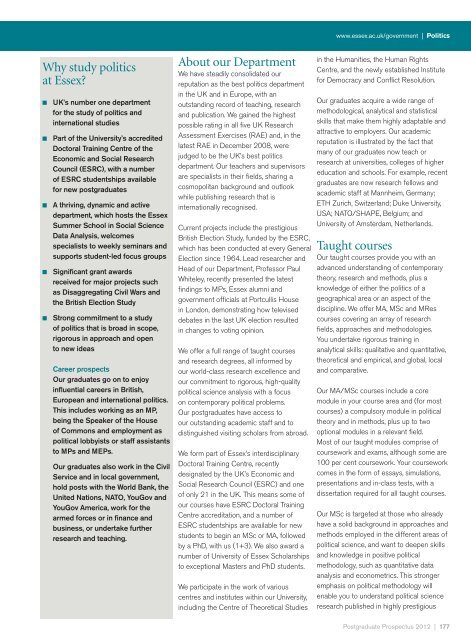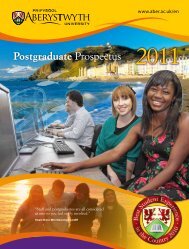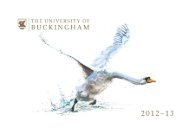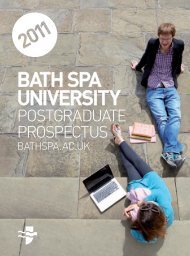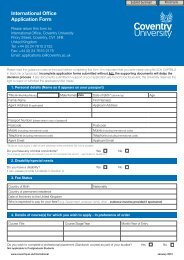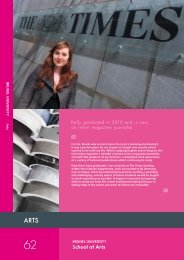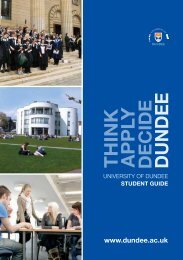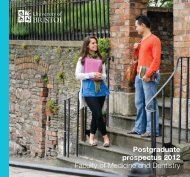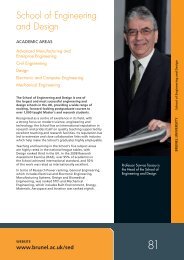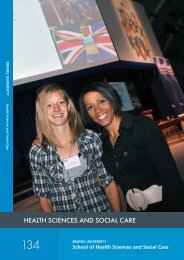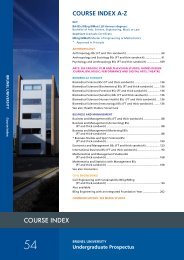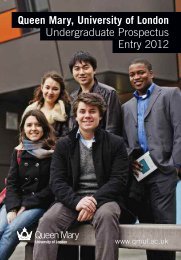Postgraduate Prospectus
Postgraduate Prospectus
Postgraduate Prospectus
You also want an ePaper? Increase the reach of your titles
YUMPU automatically turns print PDFs into web optimized ePapers that Google loves.
www.essex.ac.uk/government | Politics<br />
Why study politics<br />
at Essex?<br />
n<br />
n<br />
n<br />
n<br />
n<br />
UK’s number one department<br />
for the study of politics and<br />
international studies<br />
Part of the University’s accredited<br />
Doctoral Training Centre of the<br />
Economic and Social Research<br />
Council (ESRC), with a number<br />
of ESRC studentships available<br />
for new postgraduates<br />
A thriving, dynamic and active<br />
department, which hosts the Essex<br />
Summer School in Social Science<br />
Data Analysis, welcomes<br />
specialists to weekly seminars and<br />
supports student-led focus groups<br />
Significant grant awards<br />
received for major projects such<br />
as Disaggregating Civil Wars and<br />
the British Election Study<br />
Strong commitment to a study<br />
of politics that is broad in scope,<br />
rigorous in approach and open<br />
to new ideas<br />
Career prospects<br />
Our graduates go on to enjoy<br />
influential careers in British,<br />
European and international politics.<br />
This includes working as an MP,<br />
being the Speaker of the House<br />
of Commons and employment as<br />
political lobbyists or staff assistants<br />
to MPs and MEPs.<br />
Our graduates also work in the Civil<br />
Service and in local government,<br />
hold posts with the World Bank, the<br />
United Nations, NATO, YouGov and<br />
YouGov America, work for the<br />
armed forces or in finance and<br />
business, or undertake further<br />
research and teaching.<br />
About our Department<br />
We have steadily consolidated our<br />
reputation as the best politics department<br />
in the UK and in Europe, with an<br />
outstanding record of teaching, research<br />
and publication. We gained the highest<br />
possible rating in all five UK Research<br />
Assessment Exercises (RAE) and, in the<br />
latest RAE in December 2008, were<br />
judged to be the UK’s best politics<br />
department. Our teachers and supervisors<br />
are specialists in their fields, sharing a<br />
cosmopolitan background and outlook<br />
while publishing research that is<br />
internationally recognised.<br />
Current projects include the prestigious<br />
British Election Study, funded by the ESRC,<br />
which has been conducted at every General<br />
Election since 1964. Lead researcher and<br />
Head of our Department, Professor Paul<br />
Whiteley, recently presented the latest<br />
findings to MPs, Essex alumni and<br />
government officials at Portcullis House<br />
in London, demonstrating how televised<br />
debates in the last UK election resulted<br />
in changes to voting opinion.<br />
We offer a full range of taught courses<br />
and research degrees, all informed by<br />
our world-class research excellence and<br />
our commitment to rigorous, high-quality<br />
political science analysis with a focus<br />
on contemporary political problems.<br />
Our postgraduates have access to<br />
our outstanding academic staff and to<br />
distinguished visiting scholars from abroad.<br />
We form part of Essex’s interdisciplinary<br />
Doctoral Training Centre, recently<br />
designated by the UK’s Economic and<br />
Social Research Council (ESRC) and one<br />
of only 21 in the UK. This means some of<br />
our courses have ESRC Doctoral Training<br />
Centre accreditation, and a number of<br />
ESRC studentships are available for new<br />
students to begin an MSc or MA, followed<br />
by a PhD, with us (1+3). We also award a<br />
number of University of Essex Scholarships<br />
to exceptional Masters and PhD students.<br />
We participate in the work of various<br />
centres and institutes within our University,<br />
including the Centre of Theoretical Studies<br />
in the Humanities, the Human Rights<br />
Centre, and the newly established Institute<br />
for Democracy and Conflict Resolution.<br />
Our graduates acquire a wide range of<br />
methodological, analytical and statistical<br />
skills that make them highly adaptable and<br />
attractive to employers. Our academic<br />
reputation is illustrated by the fact that<br />
many of our graduates now teach or<br />
research at universities, colleges of higher<br />
education and schools. For example, recent<br />
graduates are now research fellows and<br />
academic staff at Mannheim, Germany;<br />
ETH Zurich, Switzerland; Duke University,<br />
USA; NATO/SHAPE, Belgium; and<br />
University of Amsterdam, Netherlands.<br />
Taught courses<br />
Our taught courses provide you with an<br />
advanced understanding of contemporary<br />
theory, research and methods, plus a<br />
knowledge of either the politics of a<br />
geographical area or an aspect of the<br />
discipline. We offer MA, MSc and MRes<br />
courses covering an array of research<br />
fields, approaches and methodologies.<br />
You undertake rigorous training in<br />
analytical skills: qualitative and quantitative,<br />
theoretical and empirical, and global, local<br />
and comparative.<br />
Our MA/MSc courses include a core<br />
module in your course area and (for most<br />
courses) a compulsory module in political<br />
theory and in methods, plus up to two<br />
optional modules in a relevant field.<br />
Most of our taught modules comprise of<br />
coursework and exams, although some are<br />
100 per cent coursework. Your coursework<br />
comes in the form of essays, simulations,<br />
presentations and in-class tests, with a<br />
dissertation required for all taught courses.<br />
Our MSc is targeted at those who already<br />
have a solid background in approaches and<br />
methods employed in the different areas of<br />
political science, and want to deepen skills<br />
and knowledge in positive political<br />
methodology, such as quantitative data<br />
analysis and econometrics. This stronger<br />
emphasis on political methodology will<br />
enable you to understand political science<br />
research published in highly prestigious<br />
<strong>Postgraduate</strong> <strong>Prospectus</strong> 2012 | 177


